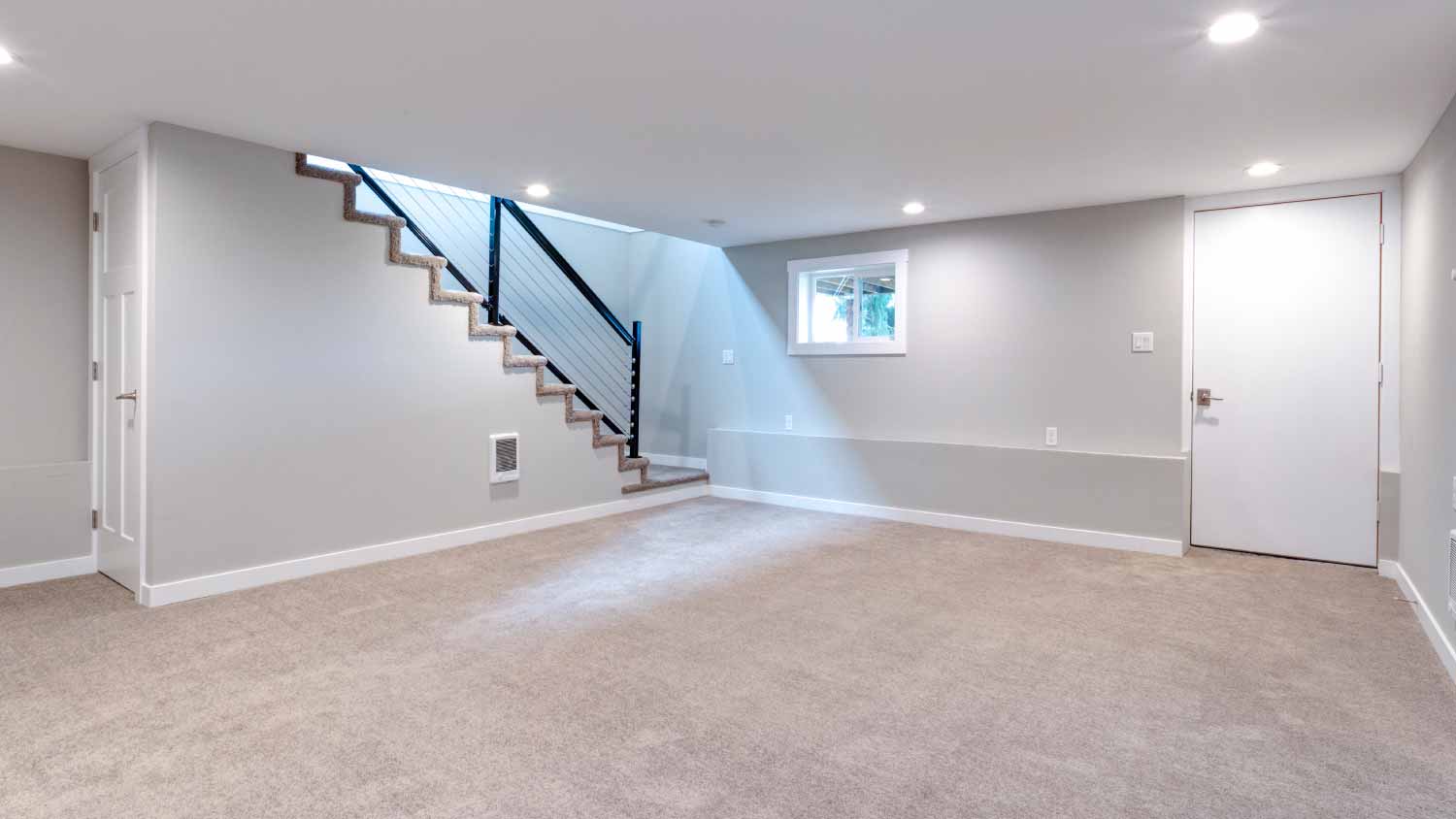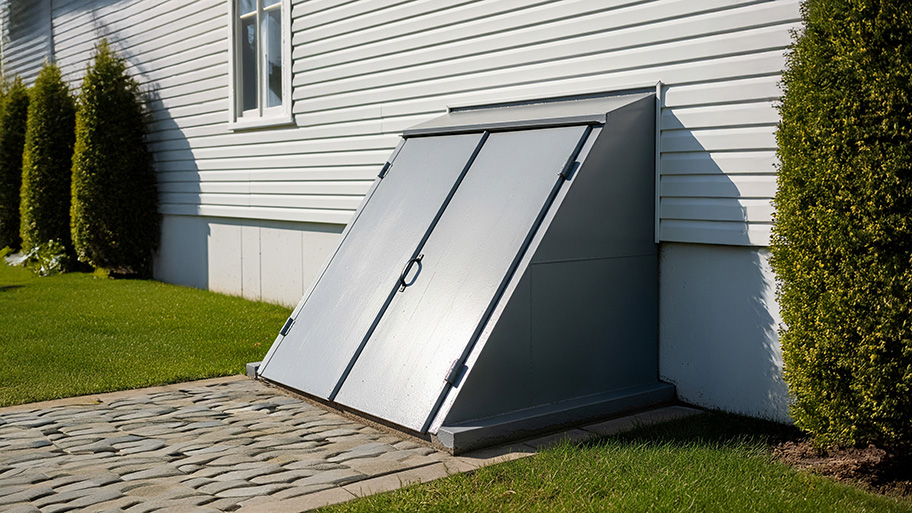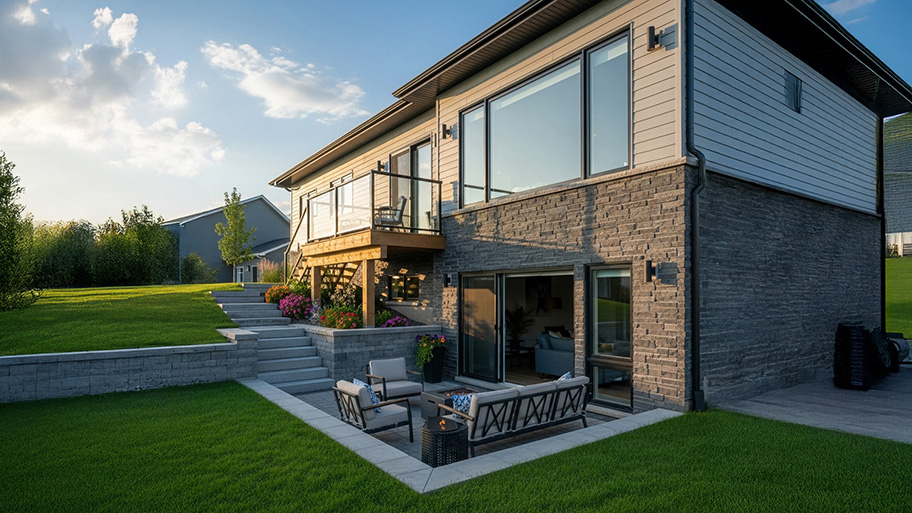
The cost of installing a wine cellar varies based on square footage, the type of wine cellar or wine cave, materials used, where it is located in the property, and where you live. Use this guide to find how much your wine cellar will cost.
Having a professional finish your basement takes 5 weeks on average


It takes an average of 5 weeks to finish a basement.
The basement size and intended use are two major time factors to consider.
Subcontractors and inspections can add weeks to your timeline.
Finishing a basement takes a lot of work, from framing in front of your concrete walls and roughing in the necessary utilities to drywall prepping, painting, and adding finishing touches. In this guide, we’ll explain how long it takes to finish a basement and discuss some factors you should consider when determining your timeline.
It takes about three to eight weeks to finish a basement, but it’s not uncommon for the project to take as little as two weeks or longer than 12 weeks, depending on the speed and availability of the contractor you hire.
There are quite a few steps you’ll need to check off in order, and completing any one of them earlier or later than expected can affect the timeline. Some general steps include the following:
Framing: The first step is framing in front of your concrete walls. In some areas, contractors take extra precautions to build a moisture-resistant bridge between the two to prevent rotting. On average, framing will take around three to six days.
Utility rough-in: Next, your contractor will rough in utilities, including electrical wiring, plumbing lines (if applicable), and connections for heating and/or cooling equipment. The average timeline for this step is three to seven days. This process can take longer if scheduling with subcontractors is necessary. It could be just one to two days if you only need electrical wiring.
Insulation: Insulation can take between one and three days, depending on the type of insulation you need and whether it requires a moisture barrier.
Drywall installation: Expect the drywall installation to take between five and 16 days, which includes installing the drywall, taping, and spackling, as well as drying time for the spackle.
Doors and trim: Installing doors and trim should take between two and six days. This timeline will depend on the number of doors and trimmed-out windows and could be longer if you also want crown molding throughout the space.
Painting: Painting a finished basement should take between two and four days. That includes prepping the space, two coats of paint, and the drying time for each coat.
Flooring: Installing flooring typically takes two to four days. This step can vary based on the type of flooring, especially if you need a subfloor underneath the primary flooring material.
Fixtures and finishing touches: Installing switches, outlets, and electrical fixtures and adding any finishing touches should take between one and five days, largely depending on the complexity of the space you want your contractor to finish.

As you might guess based on the large range of standard basement finishing timelines, there are quite a few factors that can affect your project duration.
As is the case with any home improvement project, the size of your basement will play a role in the project timeline. Larger basements demand more labor at every step of the way, so the larger your basement is, the longer it will likely take to finish.
The time estimates above are based on a standard 1,000-square-foot basement, so larger basements will likely take longer, and smaller ones could take significantly less time, on average.
The time it takes to finish your basement also depends on how you intend to use the space and your basement remodel ideas. For example, if you just plan on doing some light entertaining in the basement and you don’t need to add plumbing fixtures, you could instantly shave a few days or even an entire week off of your timeline.
On the other hand, if you plan on using your basement as an accessory apartment, installing a full bathroom and kitchen could extend the timeline by several weeks, not to mention the likelihood of the additional utilities and fixtures increasing the cost of finishing your basement.
In the time estimates above, we’ve included one to five days for finishing touches, but this could increase significantly, depending on your desired finishes.
For example, if you want custom cabinetry installed for storage or to build a kitchenette, you could be looking at several weeks of added time. If you prefer real hardwood flooring over a subfloor, you might be looking at several more days of preparation before your contractor completes the flooring step.
While upscale finishes will usually take longer, they could lead to your finished basement adding more to your home value, so they can be worth it.
According to data from Angi, most homeowners are looking for input from a professional, with around 57% wanting a recommendation and about 37% of homeowners wanting sketches or a basic idea for a project. Take a look at how other homeowners feel about prep for a basement remodel.
During a home renovation, you may need a place to stay for a few weeks or months. First, ask friends or family if they can host you during the project's duration. If that's not an option, you can look into renting a small furnished home or apartment with a short-term or month-to-month lease. Vacation rental sites may also offer a good value if you book for an extended stay—especially if it's off-season. Remember: furnishings and flexibility are key.
Finishing a basement entirely on your own is not a DIY-friendly project. Not only will it likely take significantly longer to complete if you do it yourself, but if not done correctly, it could cause major issues with electrical, plumbing, and moisture damage. In the majority of cases, knowing who to hire for a basement remodeling project will save you time and stress—especially when it comes to electrical and plumbing work.
However, there are some simple aspects of the project that you can handle on your own, such as painting drywall or installing drop ceilings. These are rewarding DIY tasks that can shave a bit of money off your overall budget.
If you hire a basement remodeling specialist near you who uses subcontractors to get the job done, you could be looking at significant delays in scheduling each portion of the work your contractor subcontracts out. The more subcontractors your remodeling specialist uses, the more likely you are to add multiple days or even weeks to your timeline.
Additionally, the speed at which your main contractor works and their general availability will play a part in how long it takes to finish your basement.
Another important thing to consider is basement code requirements. Depending on where you live, you might need building permits to do any finishing work, while some municipalities might only require permits for installing utilities in the space. The permitting process can add days or weeks to your timeline, as you might need to wait for the proper inspections before work can continue.
From average costs to expert advice, get all the answers you need to get your job done.

The cost of installing a wine cellar varies based on square footage, the type of wine cellar or wine cave, materials used, where it is located in the property, and where you live. Use this guide to find how much your wine cellar will cost.

When storm season is approaching, ensure you’re ready to go in case of an emergency. Explore our guide to budgeting for bulkhead replacement costs.

Walkout basements cost more to install than traditional basements. Our guide explores the factors that affect how much a walkout basement costs.

Transforming your basement into the game room of the year? Here's what to know about finished basement code requirements before you get started.

Wondering what’s considered a finished basement? Learn what distinguishes a finished basement from an unfinished one and which is right for you in this guide.

Converting your basement lets you gain valuable living space. Learn how to turn a basement into a living space with these nine tips.